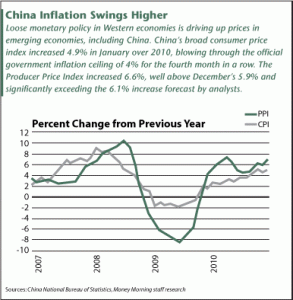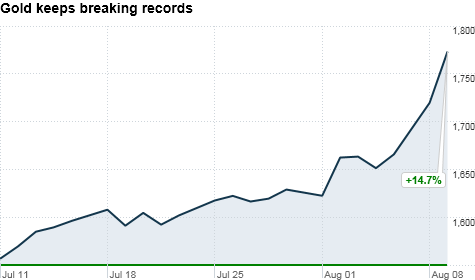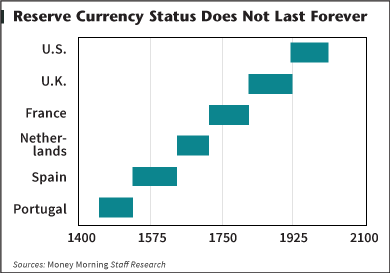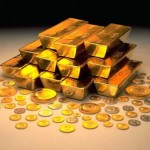Gold Fever in China Sparks “Global Phenomenon” of Demand for Yellow Metal!
Inflation risk is driving “explosive” buying of physical gold in China, putting the country on a path to becoming the world’s number one gold consumer and driving demand for the yellow metal to a 10-year high.
Chinese demand for gold bars and coins reached 180 tons in 2010, up a whopping 70% from 2009, Albert Cheng, the World Gold Council’s managing director for the Far East, said at a news conference last Thursday.
Chinese demand for gold jewelry hit an all-time high of 400 tons in 2010, the WGC said.
China was the “strongest market for investment demand” in gold last year, Cheng said while discussing findings released in the 2010 Gold Demand Trends Report. He added that Chinese gold demand nearly tripled in the last 10 years to around 600 metric tons – and that it may double again in less than a decade.
India was still the biggest market for gold during 2010, with total demand rising by 66% to 963 tons, the WGC said. Buying may slacken this year, however, because the government is likely to increase import duties on gold in the forthcoming budget.
Gold imports by India, the largest buyer of gold in the world, climbed to a record of 918 metric tons in 2010, driven by a surge in jewelry demand with Indians continuing to buy jewelry as a store of value.
“Last year was a great year for gold globally, and especially for India and China. India emerged as the strongest market with total demand rising…amid strong economic growth,” Ajay Mitra, the WGC’s Managing Director for the Middle East and India, told reporters.
Inflation Drives Demand Higher
Investment demand for gold in China was especially hot in the fourth quarter of 2010, rising 84%, said Wang Lixin, the WGC’s China managing director, attributing the surge mainly to concerns about inflation.
“The main motivation behind this demand has been concern over domestic inflation pressure and poor performance of alternative investments, combined with expectations of further gold price gains,” the WGC’s report said.
The significant increase in demand seen in China, India and around the planet is reflective of the uncertainty facing consumers as people buy gold to protect themselves from macroeconomic risk and rising inflation.
After an extended period of tame inflation, relentless increases in commodity costs are beginning to filter through the global economy.
“Inflation is beginning to cross-pollinate as ultra-loose monetary policy in the United States is exported to places like China, pushing up wages and commodity prices…” analyst Anthony Mirhaydari wrote last week in a column for MSNMoney.
 Core consumer prices in China increased 2.6% year-over-year in January, after posting a 2.1% rise in December. The producer price index (PPI) jumped 6.6% — well above December’s 5.9% and significantly more than the 6.1% increase forecast by analysts.
Core consumer prices in China increased 2.6% year-over-year in January, after posting a 2.1% rise in December. The producer price index (PPI) jumped 6.6% — well above December’s 5.9% and significantly more than the 6.1% increase forecast by analysts.
China’s broader consumer price index (CPI) increased 4.9% year-over-year in January, exceeding the official government inflation ceiling of 4% for the fourth month in a row.
“We are seeing explosive demand for gold,” Zhou Ming, deputy head of the Industrial and Commercial Bank of China Ltd. (ICBC) precious metals department told Reuters. “As Chinese get wealthy, they look to diversify their investments and gold stands out as a good hedge against inflation.”
The WGC report also said the surging investment demand in China is a reflection of the ongoing internationalization of the Chinese yuan.
But Money Morning Chief Investment Strategist Keith Fitz-Gerald sees the Chinese government’s desire to move away from dollar-based currency reserves as a more important reason for the gold fever sweeping China.
“Appreciating gold demand will have very little to do with yuan appreciation. I have not seen any evidence the two are linked…yet,” Fitz-Gerald said in an interview. “What is really happening is that Chinese are buying gold on an institutional level to hedge away from the dollar and build in diversification. This is a conscious part of the yuan decision…the government definitely wants at least a partially hard asset backed global currency.”
Demand for Gold a “Global Phenomenon”
The price of gold soared nearly 30% last year, reaching a record high $1,431.25 an ounce in December as the dollar dropped and investors sought a store of value against the loose monetary policies of Western governments.
Global demand for gold last year rose 19% year-over-year to a 10-year high of 3,812 tons. Demand in India and China accounted for about 41% of that total.
The WGC said that the increase in investment demand for gold is a “global phenomenon,” and is set to remain strong in 2011 though growth will likely slow from last year’s pace.
China’s appetite for the yellow metal is expected to remain robust in 2011, making it a significant force in global gold prices.
Demand for gold investments in China could grow 40% – 50% this year, with gold jewelry expected to rise a more moderate 8%-10%, said the WGC’s Wang.
Meanwhile, the country continues to cement its role as the world’s largest bullion miner after it toppled South Africa from the perch in 2007.
China produced a record 340.9 tons of gold in 2010, up 8.6% over last year, the China Gold Association said last month. But that was not nearly enough to meet demand as gold imports into China soared in 2010, turning the country into a major overseas buyer for the first time.
China imported 209 tons through October 2010, up almost 500% from the total brought in the previous year, according to the Shanghai Gold Exchange. Mine output reached a record 340 tons last year, the China Gold Association said.
Government Pushing Gold in China
Although it’s rarely mentioned in the Western media, the Chinese government is encouraging their citizens to buy physical gold bullion as part of an effort to cool further investment in the red-hot real estate and housing sectors.
“Unlike the property market, investment in the gold sector is something the government is encouraging,” ICBC’s Zhou told Reuters.
China actually banned its citizens from owning gold from 1950-2003.
ICBC, the world’s largest bank by market value, sold about seven tons of physical gold in January this year, nearly half the 15 tons of bullion sold in all of 2010, Zhou said.
ICBC is also coming up with other creative ways for Chinese citizens to invest in the shiny metal.
In an initiative with the WGC, ICBC started offering physical-gold linked savings accounts in December. Over one million such accounts have already been opened, and the bank is now storing over 12 tons of gold on behalf of investors.
“There is frantic demand for non-physical gold investments. We issued 1 billion yuan ($151 million) worth of gold-price-linked term deposits in 2010, but we managed to sell the same amount over just a few days in January this year,” Zhou said, adding that investors will deposit more than 5 billion yuan ($759 million) in gold-linked accounts this year.
Last week, the bank launched its second physical gold investment product, which sells gold bars to investors. They can then be resold for cash through ICBC based on real-time gold prices.
Zhou said that the huge increase in Chinese demand would continue in 2011 due to a “choppy stock market” and concerns about how rising interest rates will affect property markets.
Fitz-Gerald says insatiable Chinese demand can do nothing but continue to drive gold prices higher.
“For global gold buyers this will have a huge impact because Chinese buying programs are going to drive prices a lot higher before this is done…especially if the dollar gets worse,” he said.
Fitz-Gerald believes gold prices will hit $2,500 in the near future.
Article Source- Don Miller, Associate Editor, Money MorningRelated Stories:
Global Investing Strategies
Profit From the One Company That Will Win the “Mobile Internet” Gold Rush
Different Investment Methods
Trade Spot Gold Online
Trade Oile Online
Trade Commodities Online
With Egypt in Turmoil, Oil and Food Prices Climb
Why you should Buy Rice Future
Shares rally as Mubarak resigns
Why you should Buy Rice Future





